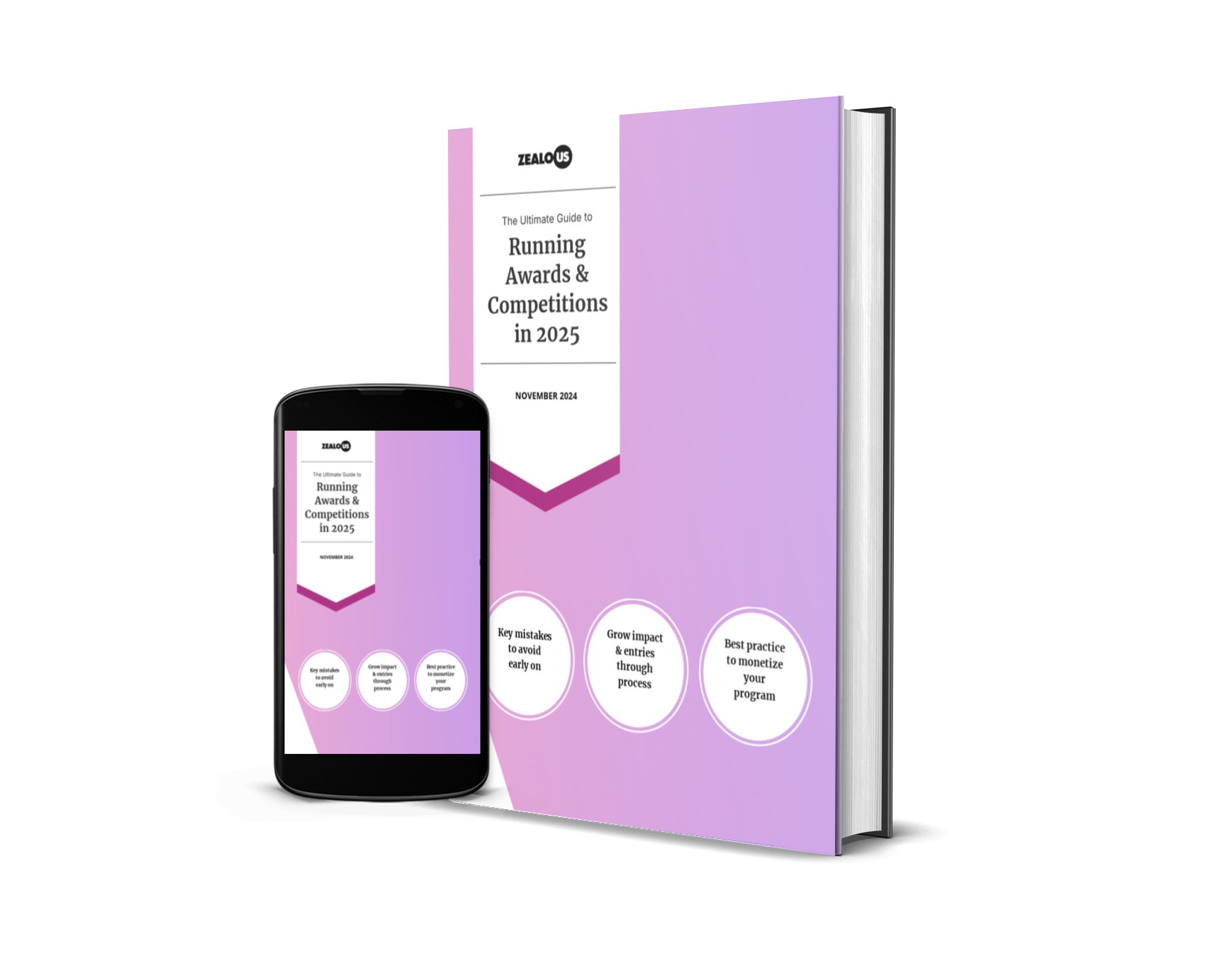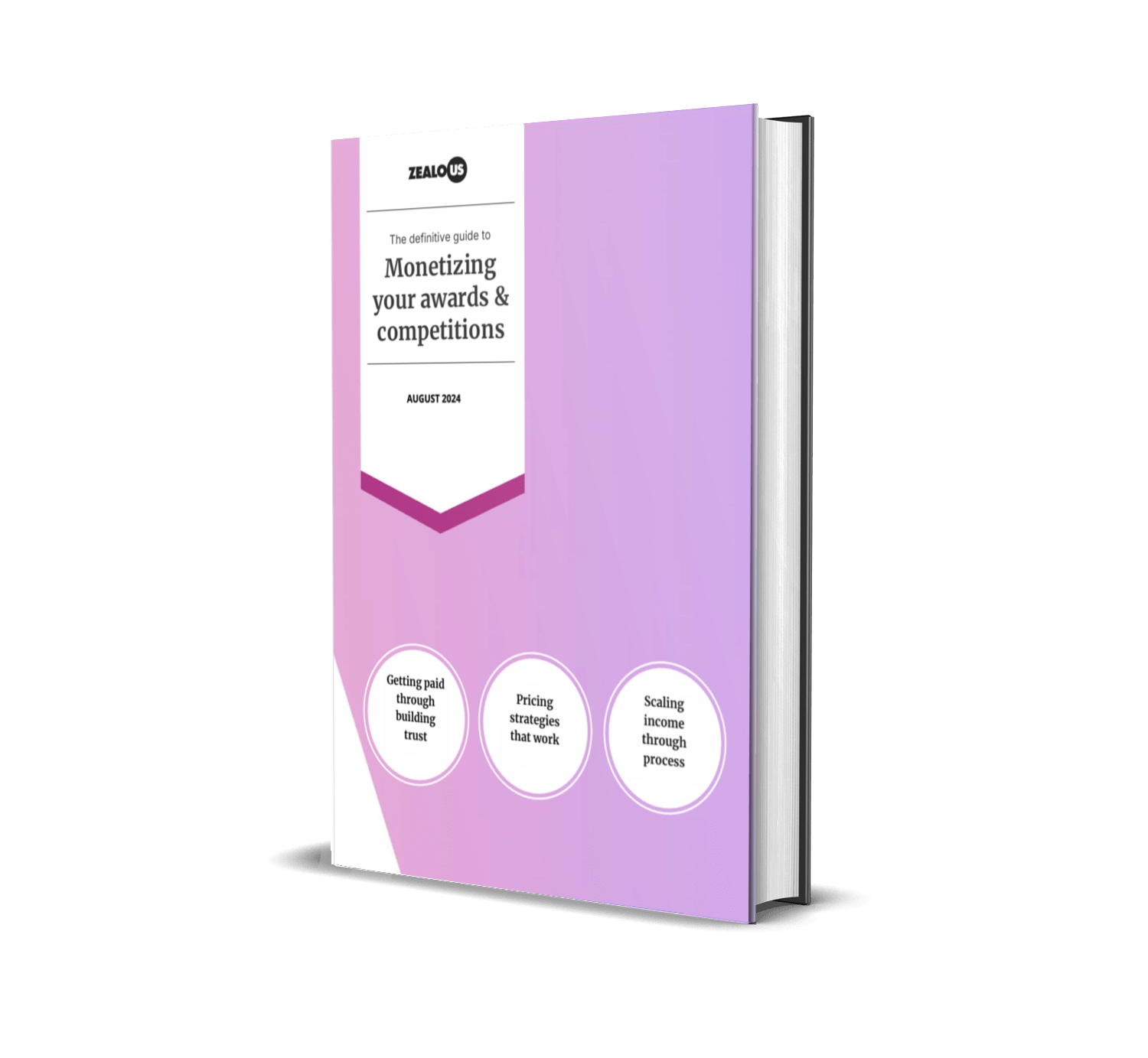Someone you trust recommends an awards program, you pay attention. See the same program advertised in your feeds? You barely notice.
Successful awards programs don’t just run efficient marketing campaigns. Instead, they’ve figured out how to activate the people who already have their ideal entrants’ attention, or “Ambassadors”.
But most of us get this backwards. We often think ambassador programs mean finding famous people to endorse us. That’s not strictly true. The real power comes from people who are already passionate about what we’re recognizing and already trusted by the professionals we’re trying to reach. Of course these can be famous people, but you shouldn’t approach them based off that basis, instead approach them based on what drives them.
Your current marketing probably isn’t enough
Here’s what happens: you spend months crafting social media campaigns, design beautiful materials, maybe buy some ads. Then you wait for quality entrants to flood in.
They don’t.
The problem isn’t your messaging. It’s that you’re trying to reach people through channels they no longer trust for professional decisions. When someone’s considering investing 2-3 days in an awards entry, a banner ad may get them curious, but that won’t be enough – they’ll seek additional guidance. They will ask their peers, look at past winners and judges…
Think about the last awards program you entered. Did you do it because of an advertisement? Or because someone you trusted said “you should look at this”?
Professional recommendations carry more weight than marketing campaigns. Always.
Awards ambassadors are NOT influencers
Traditional brand ambassadors are paid influencers pushing consumer products. Awards ambassadors work differently because professional decision-making is different. These relationships are built over time, not transactional.
The best awards ambassadors are past winners who saw real value, respected judges who understand your credibility, industry leaders who appreciate excellence, and connected professionals who share valuable opportunities naturally.
What makes them effective isn’t their follower count – it’s their professional credibility and genuine relationships. They are respected by those you serve. They will post your opportunity because it aligns with who they are, and gives them something to celebrate with their communities.
Trust changes everything
When your marketing team sends a promotional email, people know you’re selling something, the same holds true for any “pay to play” channel. When a trusted colleague forwards the same information saying “thought this might interest you,” this changes everything.
When an opportunity comes through trusted industry voices. The difference is professional reputation. People don’t risk their credibility recommending questionable opportunities. You’ve made it when a whole community is singing your praise and direct marketing becomes optional.
A cautious note – don’t consider active candidates are possible Ambassadors – why would they share your opportunity to people who could beat them in the categories they are submitting to?
Start with people who already know you
The most effective programs start with people who have real connection to what you’re doing. Past winners who received genuine value. Judges who understand your process. Industry figures who appreciate what you’re recognizing.
Don’t start by recruiting impressive names who have no connection to your program (this will be easier with the momentum from your Ambassadors). A past winner with strong professional relationships will outperform a famous person who doesn’t understand your value.
Focus on authentic connections, not impressive credentials.
Awards program marketing 101: Make sharing effortless
Most ambassador programs ask people to become marketers for something they barely know. That’s backwards, and a little insulting (they love what you do, don’t burn that bridge by going heavy on marketing).
Give them clear information about program value that aligns specifically to their interest – benefits past winners received, credibility of your judging, why someone should choose your awards and how it will enrich them (metaphorically and actually!).
Make it effortless – give them simple tools. Template emails they can personalize. Social posts that feel natural. Talking points for conversations. All linked directly to what drives them and their networks.
The goal isn’t turning ambassadors into spokespeople. It’s making genuine recommendations easy when opportunities arise naturally.
Providing ambassadors a simple one-page summary aligned specifically to them (AI might help there!) allows them to copy and paste elements of it to reference to in conversations. Simple, authentic, no time thinking about repurposing existing content or memorizing required.
Campaigns Conversations
The best ambassadors don’t actively promote your program. They mention it when relevant opportunities come up in regular professional conversations.
When someone mentions a successful project, or when your ambassadors see success stories on social media, they might jump in “that sounds like something you should consider for [Award Name] – I’ve seen how it helped [specific example].”
This works because it doesn’t feel like marketing to anyone involved. It’s professional networking – sharing opportunities that genuinely benefit colleagues.
Surgical strike instead of spray and pray
Traditional marketing focuses on reach and frequency – as many people as possible, as often as possible. Ambassador marketing works almost opposite. It’s about the right recommendation, from the right person, at the right moment.
The right moment isn’t always during your entry period. It might be when someone just completed a successful project. Or when they’re discussing career development. Or sharing opportunities at industry events.
The best ambassadors understand when recommendations are valuable and have relationships that make their suggestions meaningful.
The compound effect
Building this takes time, and wouldn’t necessarily suit everyone; but the compound effect makes it worth its weight in gold; even Einstein was heard saying “compound interest being the most powerful force in the universe” and who are we to argue with Einstein!
The real power isn’t immediate entries – it’s long-term credibility. When respected professionals consistently mention your program positively, it builds industry awareness that extends far beyond direct recommendations. Even opting to onboard 5 ambassadors per season, with each ambassador introducing you to one more each year that builds your reach exponentially over time.
Quality ambassadors can also become valuable advisors. They understand industry trends, know what professionals value, and provide insights that help you stay relevant.
What kills ambassador effectiveness
The biggest mistake is treating awards ambassadors like brand ambassadors, or worst still, influencers (too transactional!). Professional reputation is too valuable to risk on promotional activity that feels fake.
Another error is recruiting based on impressive titles rather than genuine program connection. A well-known figure with no experience will be less effective than a past winner with strong relationships and real enthusiasm.
Many programs also fail to provide ongoing value beyond asking for support. The best relationships involve regular communication about developments, early access to announcements, and recognition of contributions.
Measure what actually matters
Most programs measure the wrong things – social mentions, post reach, promotional activity. For awards, what matters is how many people enter and the quality of entrants generated.
Track the caliber of people your ambassadors connect with, relationships they maintain, trust they’ve built. An ambassador with 500 relevant professional connections often outperforms someone with 5,000 general followers.
Also track entry completion rates from ambassador referrals (people recommended by ambassadors are more likely to finish applications), quality scores of referred entries, and long-term relationships between ambassadors and successful entrants.
When ambassadors recommend programs that deliver smooth experiences, it reinforces their credibility. As one client noted, the platform “is incredibly easy to use at every stage of the process” – that positive experience makes ambassadors confident about future recommendations.
Building long-term relationships
Focus on genuine, long-term relationships rather than transactional promotional agreements. Treat ambassadors as valued advisors, over the lifetime of your program. Give them special access to make them feel valued, either to see winners first, or invite them for dinners.
This also allows you to involve them in program development, getting input on new categories, recognizing their contributions. You might even consider advisory boards that meet annually to discuss trends and evolution.
It also means communication throughout the year, not just during entry periods. Updates about developments, winner stories, industry recognition help ambassadors stay connected. Celebrate them, and be an ambassador for them too!
The strongest relationships often evolve into broader professional connections that benefit everyone beyond the immediate awards context.
Your next steps
Start with people who already understand what you’re celebrating. Focus on authentic connections rather than impressive credentials. Then have coffee and tell them about what makes you passionate about your work, and how it fits with their passion. Make genuine recommendation easy rather than requiring promotional activity.
The goal isn’t turning industry professionals into marketers. It’s making it easy for people who appreciate excellent work to recommend valuable opportunities to colleagues.
Then if they show an interest provide them with a few resources for sharing recommendations naturally (based on their background). Build long-term relationships that create compound credibility.
The most successful awards programs aren’t just marketed well – they’re recommended by people whose professional judgment commands respect. Building those relationships takes time and authenticity, but as marketing channels become increasingly manipulated by AI algorithms, being human becomes the most effective marketing investment most programs will ever make.
Let us know you want us to write more content like this with a love!
Share

Guy Armitage
Founder
View Profile
Ready to build your ambassador program? Download our “Awards Ambassador Toolkit” with templates for recruitment, recommendation tools, and tracking systems that turn industry connections into your most powerful marketing channel.




